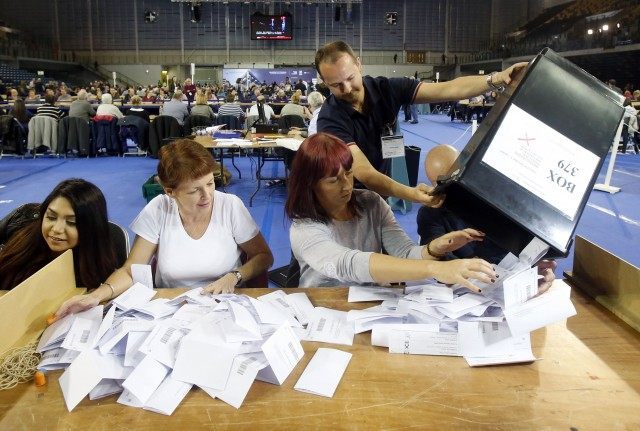Now that the dust has to some extent settled in the wake of the general election, it is time to make a measured assessment of its consequences. The first obvious point is that the result came as a total surprise to all concerned – winners, losers, pollsters and voters alike. Anybody who claims they foresaw this outcome is being economical with the truth.
This was a disastrous election result and there is no point in patriotic citizens with a fervent love of Britain and its traditions pretending last Thursday’s vote was anything other than a grave disappointment. At the same time, however, it is important to recognise that there were some consolations among the multiple disappointments, otherwise there is a danger that the true conservative support now concentrated around UKIP could fall into a state of self-destructive despair, which is precisely what our enemies hope will happen.
First of all, we must confront the aspects of the election that were most catastrophic. The failure of Nigel Farage to win Thanet South and the loss of Mark Reckless were the two most dismaying developments. Their defeat in no way reflects on the efforts of either man: Farage, in particular, was beset by the most overwhelming concentration of resources deployed against him by all the legacy parties. Any thoughtful person knew that the British liberal oligarchy would not easily surrender its monopoly of power and the ferocious counter-offensive by the PC consensus in Thanet South demonstrated that fact.
The PC consensus is not just a British phenomenon: it is international. This was illustrated by the parachuting in by the Conservatives of American volunteers from the Young Republicans International Committee to campaign against UKIP. Could there be any more striking demonstration of the decadence of so-called right-wing parties than the mobilisation of American pseudo-conservatives to resist the only genuine conservative party in Britain?
Many Americans contribute comments to this blog and their participation is welcome and appreciated. They, like us, are disgusted by the behaviour of the faux conservative Republican Party under the control of RINOs (Republicans In Name Only). It is to be hoped they will take note that the GOP allowed its volunteers to be used to oppose the nearest parallel to a Tea Party that Britain has and that they will voice their dissatisfaction on the other side of the Atlantic. Liberals make common cause globally; it is time for conservatives to do the same.
On the face of it, things look pretty bleak for British conservatives and for UKIP. However, we must not allow understandable dismay at the outcome of the election to blind us to the fact that there were genuine nuggets of consolation – and even of opportunity – buried among the rubble of UKIP supporters’ hopes. There are significant pluses as well as minuses. The election was not a universal victory for the legacy parties. One of them, the Liberal Democrats, has been annihilated. The Labour Party is very badly damaged. Even the supposedly triumphant Conservatives are in a far more precarious situation than the popping of champagne corks in Downing Street would suggest.
Tory governments have, in the past, experienced chaos when governing with a majority of around 25 seats. A majority of five or six is an implosion waiting to happen. By-elections, Europe, Scotland and the temperamental incompetence of Dave will doom this government to progressive dissolution. By 2020 it is likely the Tories will be as unelectable as Labour is now.
UKIP still has everything to play for: its hour may come in 2020. But the party also faces perils. It must not succumb to disillusionment or infighting. The political class desperately hopes this electoral disappointment will cause UKIP to disintegrate. It must not do so: unity at all costs and a sense of reasoned optimism are its prime requirements. This difficult time is a test that UKIP must pass.
It also has a new asset in its favour, in that it is now the potential beneficiary of the English sense of fair play. Last Thursday, 1.4 million people (4.7 per cent of the vote) voted for the SNP and were rewarded with 56 Commons seats, amounting to nine per cent of the House; 3.8 million people (12.6 per cent of the vote) voted for UKIP and received one seat in Parliament, amounting to 0.2 per cent of Commons seats. The fanciful name by which the political establishment describes this travesty is “representative democracy”. Reforming that charade is a crusade on which conservatives must now embark.
We can be confident, too, that the barely cosmetic “reforms” Dave will eventually bring back from his insincere pseudo-negotiations in Brussels will further harden opinion against his administration. Add to the toxic cocktail that most fearsome menace that hangs over all governments – “Events, dear boy” – and it is clear there is still a major opportunity for UKIP to play an historic role in the resurrection of
Britain. Don’t get mad, get even.

COMMENTS
Please let us know if you're having issues with commenting.